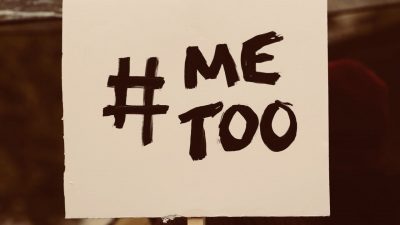
Yes, it’s harder to be a man in the #MeToo #TimesUp era – grow up about it
Is it hard to be a man these days, as actor William H. Macy and others are saying? Has it suddenly become more complicated for men to go after women for sex, and escape consequences when the chase goes awry?
It certainly has. As it should. Now’s the time for heterosexual men to adjust to the overdue new reality that’s setting in and stop treating women like sex is the main reason they’ve been put on this earth.
There was no clearer illustration of that attitude than the double political hit of the past few days: Casino mogul Steve Wynn had to resign as finance chair of the Republican National Committee amid charges of rampant sexual harassment and assault. And Hillary Clinton had to defend how her 2008 presidential campaign handled sexual harassment allegations against its faith outreach director, Burns Strider.
Like many men, Macy seemed to be struggling to process the moment of swift cultural change set in motion by the Harvey Weinstein sex abuse revelations last fall and captured by the #MeToo and #TimesUp movements. “It’s hard to be a man these days,” Macy said in an interview backstage last week at the Screen Actors Guild Awards. “A lot of us feel like we’re under attack and feel like we need to apologize. Perhaps we do. Perhaps we are.”
In Hollywood and other major sectors of American life, parades of women have been speaking bravely and candidly about the sexual misconduct men have inflicted on them. They’ve been calling out wider patterns of entitlement and abuse that reduce women to less than the complex, intelligent and capable people they are.
Macy, when asked what advice he would give to younger men about how to interact with women, seemed caught between two worlds: the one that’s been, in which men are allowed lots of leeway to pursue women for sex and abuse their authority to get it, and the one now emerging, in which women are treated as equals — valued for their brains, not their bodies — and free passes are no longer given under the foolish notion that “boys will be boys.”
Macy is right about the need for apology. But men are not “under attack” — not unless you think it’s an “attack” when a bully is called out, stopped and given his comeuppance.
If you want to know who’s been under attack, ask women. You’ll hear story after story of being badgered by men who won’t take “no” for an answer, of being backed into corners where there’s no way out, physically or otherwise. You’ll hear story after story of women being treated as though their bodies and sexuality are not fully theirs but, rather, something to which men have a rightful claim.
Men, how would you like it if your workplace colleagues were more interested in the shape of your body than your ability and ideas? If your boss made it clear your career prospects depended on giving in to his sexual advances? If you were expected to smile your way through such an ordeal and “take it as a compliment”?
That’s how it’s been for many women.
Talk to the women in your life. Read their stories on the Internet and in the media. You’ll learn about the tactics they’ve had to develop, like giving out fake phone numbers to heavy-handed men who won’t let up at a bar or a party, like female bystanders overhearing a menacing conversation and intervening by giving the victim a big hug and pretending to be her friend. These should not be necessary.
In his backstage interview, Macy said he had recently taken part in a men’s meeting under the auspices of the #TimesUp movement. “We talked,” Macy said, accurately pointing out that men don’t do enough of that.
Indeed, men should be talking. Here’s what we should be telling each other about how to relate to women.
Stop treating them as though they exist to please our eyes and excite our bodies. Stop putting them in impossible situations where they’re a “slut” if they do or a “bitch” if they don’t. Stop treating sex as a form of recreation while leaving women to deal with the profound reproductive consequences.
So you’re not sure anymore how to approach a woman to whom you’re attracted? Start by getting to know her as a person and developing a relationship with her.
So you can’t handle it when a woman rebuffs you? It’ll be OK. You’ll meet other women. As Kelly Macias writes at Daily Kos, “Men need to learn that rejection is part of life and that you won’t actually die when someone you are interested in isn’t interested in you.”
Sure, it probably has gotten harder to be a man. Let’s man up about it. Better yet, let’s grow up.
Disclaimer: Articles featured on Oregon Report are the creation, responsibility and opinion of the authoring individual or organization which is featured at the top of every article.

